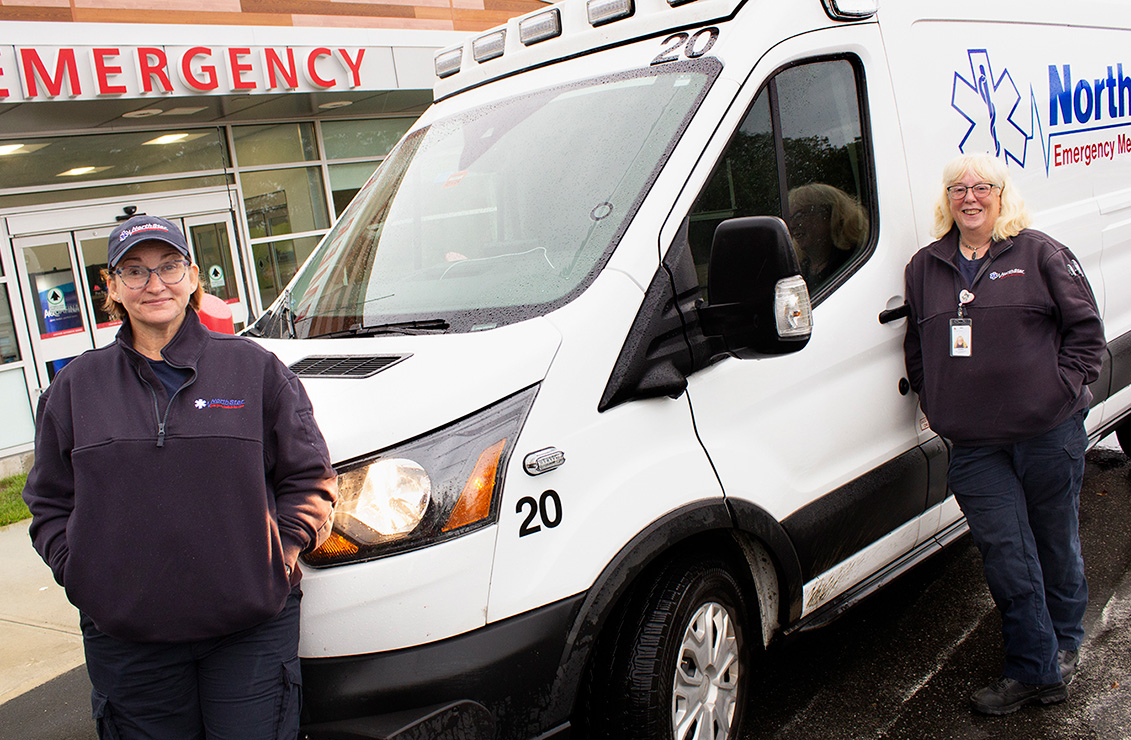Working Together to Improve Inter-facility Transports

Tamra Ballance, EMT (left) and Donna Weare, EMT (right)
When, Mark McAllister, MD, entered an emergency department exam room at Pen Bay Medical Center (PBMC) in early 2022, he knew the patient needed to be transported to Maine Medical Center (MMC) for surgery. And fast. The patient had an aortic dissection, a tear deep in the body’s main artery that can quickly rupture and lead to almost immediate death.
However, weather had grounded the LifeFlight helicopters that day, and the specialized ambulance crews needed to keep a patient stabilized during the two-hour trip to Portland were not available.
“So, I had my secretary call our local EMS agency, and I said, ‘Get me someone who can drive the ambulance and knows where stuff is, and I’ll go,’” Dr. McAllister later told the Portland Press Herald.
In a state where strained local ambulance services have traditionally focused on 911 calls, Dr. McAllister’s heroics highlight long-standing challenges to providing timely inter-facility transports.
Recognizing the need for a more efficient approach, the PBMC emergency department has helped lead the effort to improve inter-facility transport. Their high patient volume and geographic distance from a tertiary care center makes them particularly vulnerable to lack of reliable EMS resources.
“The goal,” said Tyler Giberson, MD, Chair of Emergency Medicine for PBMC and the Emergency Medicine Specialty Council for MaineHealth, “is to guarantee the ability to transport patients in an expedited timeframe by ambulance.”
Enter NorthStar, a MaineHealth ambulance service which has traditionally serviced Franklin County 9-1-1 and inter-facility transport needs. Northstar’s Michael Senecal collaborated with Nancy Jackson, RN, the nurse director for PBMC and WCGH, along with the nursing teams in each ED, to develop an inter-facility program based in part on work NorthStar had already begun at Maine Medical Center. NorthStar quickly acquired ambulances for the PBMC and Waldo County General Hospital (WCGH) fleet in late 2022 and then set out to hire 29 full-time and per diem paramedics and emergency medical technicians.
The new team completed its first inter-facility transport in mid-February. Since then, it has completed more than 500 transports, mostly to Maine Medical Center. All those trips added up to more than 3,000 staff hours for the ambulance crews.
Saving Time and Improving Patient Care
The initiative, which now has expanded to several other MaineHealth hospitals, has already yielded remarkable results. The percentage of patients waiting more than three hours for a transfer out of the ED has been reduced by 25%. This not only represents a significant advancement in patient care but also ensures that access to higher levels of medical attention is provided without unnecessary delay.
The MaineHealth vision of a durable, statewide, inter-facility transport system includes a core mission: to be part of the solution that guarantees optimal emergency response and transport for years to come.
As for Dr. McAllister and his patient, the race against the clock to MMC proved successful. The ambulance arrived at MMC just before 9:00 pm, paving the way for the patient’s aorta to be repaired after several hours of surgery.
Dr. McAllister expressed gratitude for the positive patient outcome, along with relief that such extreme measures are less likely to be necessary in the future. Thanks to this innovative health care collaboration, patients in need of inter-facility transport can now access the care they require promptly and without unnecessary delays.
NorthStar Ambulance
With state-of-the-art equipment and modern ambulances, the NorthStar team responds to thousands of calls each year, ranging from medical emergencies to nursing home transfers. Learn more about Northstar.

